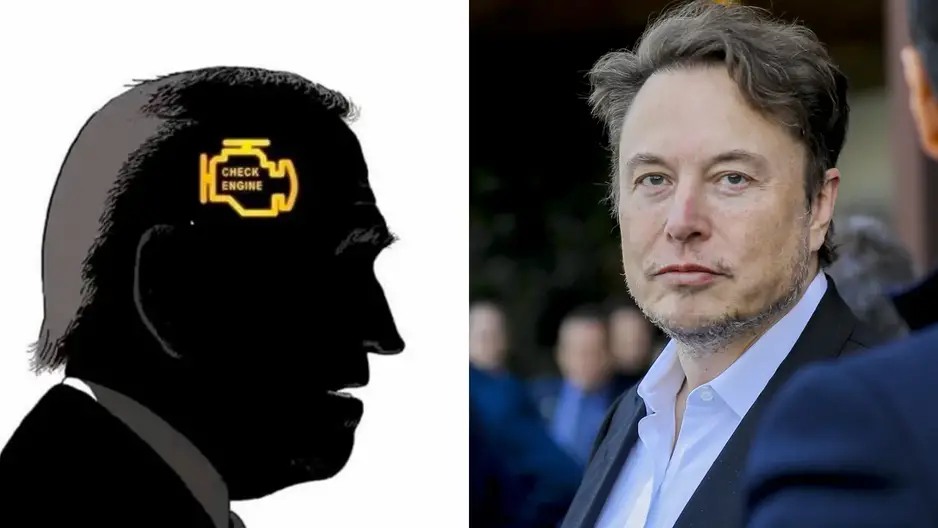Elon Musk, the billionaire entrepreneur known for his groundbreaking work in electric vehicles and space exploration, recently made headlines for a different kind of statement. During a candid interview, Musk quipped, “I’ve never seen a single person wearing a ‘Build Back Better’ hat!” This remark, which has since gone viral, has sparked widespread discussion and debate across social media and traditional news outlets.

The “Build Back Better” slogan has been a central part of President Joe Biden’s administration, representing a comprehensive plan to revive the U.S. economy and improve infrastructure following the COVID-19 pandemic. The plan encompasses a wide range of initiatives, from investments in clean energy and healthcare to efforts aimed at reducing economic inequality.
Elon Musk, known for his provocative comments and willingness to challenge the status quo, made the remark during an interview on a popular podcast. The context of the conversation was the current political climate in the United States and the effectiveness of various government initiatives. Musk’s comment was seemingly offhand but has resonated with many who view it as a critique of the visibility and impact of the administration’s efforts.
The reaction to Musk’s statement has been polarized, much like the political landscape in the U.S. today. Supporters of Musk have praised him for speaking what they believe to be the truth about the administration’s branding and public engagement efforts. Critics, on the other hand, have accused Musk of undermining important governmental initiatives and using his platform to promote cynicism.
On Twitter, the hashtag #BuildBackBetterHat started trending shortly after Musk’s comment. Some users posted pictures of themselves wearing custom-made “Build Back Better” hats, while others used the opportunity to voice their frustrations with the current administration’s policies.
“Elon Musk just said what we’re all thinking,” tweeted one user. “I’ve never seen anyone wearing those hats either. It’s all talk, no action.”
Conversely, another user countered, “Musk’s comment is a distraction. The ‘Build Back Better’ plan is about real policies that affect real lives, not about merchandise.”
Musk’s comment touches on a broader issue about the power and importance of branding in politics. The “Make America Great Again” (MAGA) hats, popularized by former President Donald Trump, became iconic symbols of his campaign and presidency. They were visible at rallies, protests, and in everyday life, making them a powerful tool for rallying support and creating a sense of identity among his followers.
In contrast, the “Build Back Better” slogan, while central to Biden’s policy agenda, has not achieved the same level of visibility or cultural penetration. This disparity raises questions about the effectiveness of political branding and the role it plays in shaping public perception and engagement.
Elon Musk’s political views have always been somewhat enigmatic and difficult to categorize. He has donated to both Democratic and Republican candidates in the past and has voiced support for various policies across the political spectrum. Musk’s primary focus tends to be on issues directly related to his business interests, such as climate change, space exploration, and technological innovation.
His recent comments about “Build Back Better” can be seen as part of his broader critique of governmental inefficiency and bureaucracy. Musk has often expressed frustration with regulatory hurdles and the slow pace of governmental processes, which he believes hinder innovation and progress.
Musk’s remark, while seemingly trivial, has broader implications for the current political discourse. It highlights the challenges that the Biden administration faces in communicating its policies and engaging with the public in a meaningful way. The lack of a strong, recognizable symbol like the MAGA hat may contribute to a sense that the administration’s efforts are not as visible or impactful as they could be.
Additionally, Musk’s comment underscores the growing influence of celebrity figures and entrepreneurs in shaping political narratives. As one of the most prominent and outspoken figures in the tech industry, Musk’s opinions carry significant weight and can influence public perception and discourse.
In response to the controversy, some political analysts have suggested that the Biden administration needs to rethink its approach to public engagement and branding. Effective communication is crucial for gaining public support and ensuring that policies have the desired impact. Whether or not the administration takes this advice to heart remains to be seen.
For Elon Musk, this incident is just another example of his ability to stir the pot and generate discussion. Known for his bold statements and willingness to challenge conventional wisdom, Musk continues to be a polarizing figure who sparks debate wherever he goes.
Elon Musk’s offhand comment about never seeing a “Build Back Better” hat has opened up a larger conversation about political branding, public engagement, and the effectiveness of governmental initiatives. While some see his remark as a valid critique of the current administration’s visibility and impact, others view it as a distraction from the substantive policies and efforts being made to improve the country.
As the U.S. continues to navigate a complex and polarized political landscape, figures like Musk will undoubtedly continue to play a significant role in shaping public discourse. Whether you agree with his views or not, there is no denying that Elon Musk has a unique ability to capture the public’s attention and provoke thought and discussion on a wide range of issues.
In the end, the real test for the “Build Back Better” initiative will be its tangible outcomes and the lasting impact it has on American society. While hats and slogans can help with visibility, it is the policies themselves that will determine the administration’s success in the eyes of the public. As Musk’s comment continues to circulate, it serves as a reminder of the importance of effective communication and the power of public perception in the realm of politics.